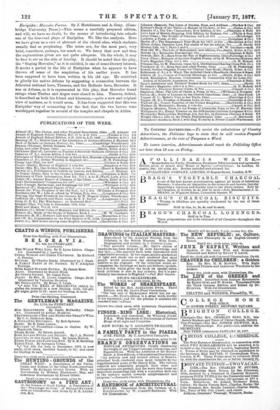Euripides : Hercules Furens. By J. Hutchinson and A. Gray.
(Cam- bridge University Press.)—This seems a carefully prepared edition, and will, we have no doubt, be the means of introducing into schools one of the loss-read plays of Euripides. We like the analysis. Here we have given us a sort of abstract of the choral odes, which students usually find so perplexing. The notes are, for the most part, very brief, sometimes, perhaps, too much so. We fancy that now and then the explanations given are not quite adequate. On the whole, it may be best to err on the side of brevity. It should be noted that the play, the "Raging Hercules," as it is entitled, is one of some literary interest. It marks a period in the life of Euripides when he appears to have thrown off some of the scepticism of his earlier years. It has been supposed to have been written in his old age. He contrived to glorify his native Athens by suggesting a connection between the Athenian national hero, Theseus, and the Hellenic hero, Hercules. It was at Athens, so it is represented in this play, that Hercules found refuge when Thebes and Argos were closed to him. Theseus, indeed, is described as both his friend and kinarnan,—quite a new and original view of matters, as it would seem. It has been suggested that this was Euripides' way of accounting for the fact that the two heroes were
worshipped together in several of the temples and chapels in Attica.


































 Previous page
Previous page